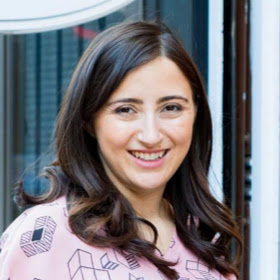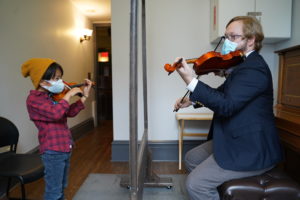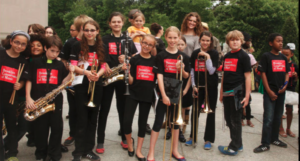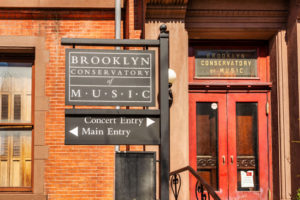Rokt’star spotlight: Rachel Hughes & Brooklyn Conservatory of Music

March is International Women’s Month, a time that is set aside to honor women’s contributions in history and celebrate the successes of the woman in our lives. In recognition of this month, we are highlighting some of our outstanding female Rokt’stars and learning more about the stellar initiatives they lead outside of Rokt.
Rachel Hughes, one of our amazing product managers, is also the chair of the diversity, equity, and inclusion working group at the Brooklyn Conservatory of Music, a non-profit that provides access to music education to thousands of New Yorkers living at or below the poverty line.
We sat down with her to learn more about BKCM, her inspirations, and how to get involved.
What inspired you to join the Brooklyn Conservatory of Music?
It’s just such a fantastic organization that does so much good in this city. BKCM is a nonprofit community music school that provides music instruction, music therapy, and community concerts to 7,500 New Yorkers of all ages, abilities, and backgrounds. Its programming takes place out of its home in Park Slope, Brooklyn, and at 72 public schools, homeless shelters, childcare centers, and other community-based organizations spanning the City’s five boroughs. Its Music Therapy program serves 1,600 youth and adults with a variety of special needs, including autism spectrum disorders, cognitive delays, emotional and behavioral difficulties, and physical disabilities. Its Music Partners program brings high-quality music education to more than 4,900 students across New York City, 4,300 of whom are elementary school students at public schools that don’t offer music programming of their own and 65% of whom live at or below the poverty level and benefit from our programming at no cost.
that provides music instruction, music therapy, and community concerts to 7,500 New Yorkers of all ages, abilities, and backgrounds. Its programming takes place out of its home in Park Slope, Brooklyn, and at 72 public schools, homeless shelters, childcare centers, and other community-based organizations spanning the City’s five boroughs. Its Music Therapy program serves 1,600 youth and adults with a variety of special needs, including autism spectrum disorders, cognitive delays, emotional and behavioral difficulties, and physical disabilities. Its Music Partners program brings high-quality music education to more than 4,900 students across New York City, 4,300 of whom are elementary school students at public schools that don’t offer music programming of their own and 65% of whom live at or below the poverty level and benefit from our programming at no cost.
What work do you do as the chair of the diversity, equity and inclusion working group?
As one of the founders of this working group, I have helped establish a working group that spans over 60 members of the BKCM community, including music faculty, staff, board members, parents, and students. The DEI working group has been helping BKCM to re-examine itself from a DEI perspective and has already been instrumental in increasing diversity on the board as well as helping to pioneer targeted efforts to increase diversity among the faculty, staff, and the student and client population. The group is also working with the faculty to rethink the programming and curriculum to achieve BKCM’s goal of building music education and music therapy experiences that actively disrupt and decentralize white, European, classical repertoire and pedagogy.
What are the biggest challenges you’ve seen through this work?
Two of the biggest challenges in doing this work are getting buy-in for DEI at the very highest levels of an organization, and making sure that DEI is not a “side project” but is interwoven into the structure and the fabric of the community. This is always an ongoing process, but I am proud to say that BKCM is incredibly committed to DEI, and is working hard to embed DEI into every aspect of what BKCM does.
Why is music education important?
 As a parent of two children who have been taking music lessons at BKCM for a combined twelve years, it’s hard to fully describe the benefit my children have received from their music education. Music education has helped them learn grit and determination, be more resilient, be better listeners, be part of a community of musicians and has given them a creative outlet that they can use to express themselves, especially in the past year. It has been especially helpful for my son, who has an ADHD diagnosis, to practice some of the executive functioning skills that are so hard for him. I passionately believe that every child deserves access to these benefits, not just those children whose parents can afford it.
As a parent of two children who have been taking music lessons at BKCM for a combined twelve years, it’s hard to fully describe the benefit my children have received from their music education. Music education has helped them learn grit and determination, be more resilient, be better listeners, be part of a community of musicians and has given them a creative outlet that they can use to express themselves, especially in the past year. It has been especially helpful for my son, who has an ADHD diagnosis, to practice some of the executive functioning skills that are so hard for him. I passionately believe that every child deserves access to these benefits, not just those children whose parents can afford it.
What inspires you to stay at Brooklyn Conservatory of Music?
The incredibly dedicated and world-class music faculty and staff. The level of intentionality, self-reflection, and continuous striving for learning I see in the faculty and staff, especially from a DEI perspective, continues to amaze me. Also, the students. Attend any BKCM concert and you will know what I mean.
How can we get involved and help?
You can volunteer or donate to BKCM on their website, I would also encourage you to check out the hundreds of free or low-cost concerts BKCM hosts every year.


